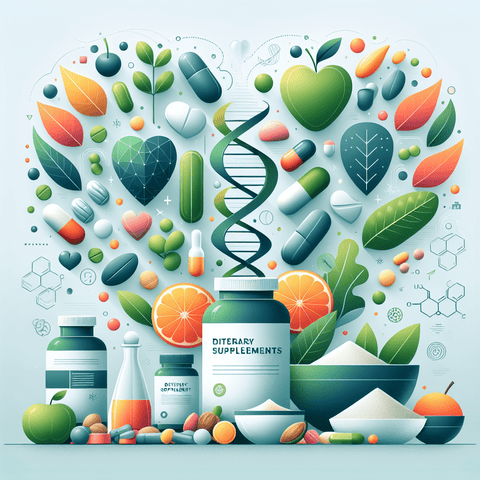Understanding the Role of Dietary Supplements in Modern Nutrition
Today, dietary supplements are more prevalent than ever. From multivitamins to fish oil capsules to herbal blends, billions of people worldwide take supplements daily to support their overall health and nutrition. The global dietary supplement market is booming, with some estimates expecting it to surpass $300 billion by 2028. This rapid growth reflects a collective desire for proactive health management, longevity, and disease prevention. Many individuals incorporate supplements to fill nutritional gaps, combat fatigue, boost immunity, improve digestion, or support specific health goals like bone density or cardiovascular health. For others, the convenience of pills and powders offers a straightforward solution to dietary limitations due to lifestyle, medical conditions, or aging. But while the allure of supplements is undeniable, an essential question arises — are they really worth it? Are these widely consumed products substantiated by science, or have they become a crutch for dietary insecurities? The truth is more complex than a simple yes or no. This blog explores whether dietary supplements genuinely deliver measurable health benefits, when they might be necessary, and how to approach their use responsibly. Let’s unpack the science, safety, benefits, and best practices that can empower you in making informed nutritional decisions.Dietary Supplements: What Are They and How Do They Fit into Nutritional Strategies?
Dietary supplements refer to any product intended to supplement the diet. This broad category includes vitamins, minerals, amino acids, enzymes, botanicals (like herbs), and other food-based extracts. They come in various forms — including tablets, capsules, gummies, powders, and liquids. At their core, these supplements are designed to add nutritional value to your diet — not replace a meal or act as medicine. The key difference lies in the source of nutrients. Nutrients from whole foods are often absorbed more efficiently due to the complex matrix of vitamins, minerals, fiber, phytochemicals, and fats inherent in food. Supplements, on the other hand, deliver isolated or synthetic nutrients or concentrations that aren’t feasible to get from food alone. People turn to supplements for various reasons: - Addressing known deficiencies (e.g., iron for anemia) - Enhancing overall wellness - Supporting immune health - Filling dietary gaps from vegetarian, vegan, or keto diets - Boosting athletic performance or muscle recovery - Meeting changing life-stage needs such as during pregnancy or aging However, regulation is an area of concern. In Europe, dietary supplements fall under the broader regulation of food products. While EFSA (European Food Safety Authority) provides scientific advice regarding health and nutrition claims, enforcement varies regionally. This often leads to inconsistent quality, making it vital for consumers to choose reputable sources with transparent labeling and third-party quality control. Those looking into supplements should understand that not all products on the market are created equal. High-quality formulations contain effective ingredient doses, minimal fillers, and are tested for purity and potency. For example, you might explore scientifically supported supplements such as [Magnesium for muscle and bone support](https://www.topvitamine.com/collections/magnesium-benefits-energy-muscle-bone-support) or [Vitamin D for bone health and immunity](https://www.topvitamine.com/collections/vitamin-d-benefits-sources-safety), depending on individual needs.Nutritional Boost: How Supplements Can Enhance Your Daily Diet
In an ideal world, everyone would get their nutrients from a balanced, whole-food diet. Unfortunately, modern life often makes optimal nutrition hard to achieve. Busy schedules, processed food consumption, soil nutrient depletion, and restrictive diets can lead to suboptimal nutrient intake. This is where dietary supplements can offer a targeted nutritional boost. Life stages and unique physiological needs are moments when supplementation becomes exceptionally useful: - Pregnant women often require folic acid, iron, and DHA for fetal development - Older adults may need more calcium, vitamin D, or B12 due to decreased absorption - Individuals with food intolerances, such as lactose intolerance, may be at risk of calcium or vitamin D deficiencies - Vegans and vegetarians often supplement with vitamin B12, iron, omega-3 (DHA/EPA), and zinc - Chronic diseases or recovery from surgery may also increase nutritional needs Scientific evidence supports supplementation’s effectiveness in specific scenarios. For instance, combining dietary intake with supplemental B12 can effectively reverse deficiency and related symptoms. Supplementing with [Vitamin C](https://www.topvitamine.com/collections/vitamin-c-benefits-immunity-antioxidant-energy) may also support cellular defense mechanisms and assist collagen formation. However, over-reliance on supplements can be problematic. Some individuals may interpret taking a daily multivitamin as permission to make poor dietary choices. Supplements do not mimic the full complexity of nutrients found in whole food. For example, eating an orange provides not only vitamin C but also fiber, water, and other phytonutrients. Furthermore, nutrient synergy — the idea that nutrients work better in tandem when consumed from whole-food sources — plays a fundamental role in how your body uses vitamins and minerals. If you're counting on isolated nutrients to do the same job, you might be disappointed — or worse, run the risk of imbalances or overdoses. That said, when used wisely, supplements can enhance nutrition, especially when used to fill a shortfall rather than serve as a long-term replacement for whole foods.Supplement Benefits: Exploring the Potential Advantages of Incorporating Supplements
Supplements are not miracle pills, but scientific literature provides strong support for their use in various contexts. Let’s explore some of the ways supplements can potentially enhance health. Immune Function: Nutrients like vitamin C, vitamin D, zinc, and selenium play crucial roles in immune response. For individuals lacking these nutrients, supplementation can support immune health. For example, clinical studies have shown that vitamin D plays a role in modulating inflammatory responses, while vitamin C is integral in skin defense and oxidative protection. Energy and Cognition: B-vitamins, iron, magnesium, and coenzyme Q10 contribute to energy metabolism. Iron-deficiency anemia is a common cause of fatigue, and appropriately dosed iron supplements have been shown to improve energy levels in iron-deficient individuals. Magnesium also contributes to reducing fatigue and supporting muscle function — browse high-quality [magnesium supplements](https://www.topvitamine.com/collections/magnesium-benefits-energy-muscle-bone-support) optimized for energy and bone health. Disease Management: People with osteoporosis often benefit from calcium and vitamin D. Individuals with anemia might require iron and B12 supplementation. Omega-3 fatty acids such as [EPA and DHA](https://www.topvitamine.com/collections/dha-epa-omega-3-supplements) have demonstrated roles in cardiovascular and cognitive health, supporting HDL cholesterol levels and neural function. Sports and Recovery: Athletes use protein powders, branched-chain amino acids, creatine, and electrolytes to enhance training performance and recovery. Omega-3s are also increasingly used to aid muscle recovery due to their anti-inflammatory properties. Psychological Well-being: There’s also a psychological component. Taking supplements may enhance one's belief in proactive health care. The placebo effect isn't always negative — feeling in control of one’s health can inspire lifestyle changes beneficial on their own. Still, it's crucial to remember that some benefits are conditional. If your nutrient levels are already sufficient, taking more will not supercharge your health. In fact, over-supplementation can lead to adverse effects — such as vitamin A toxicity or magnesium-induced digestive issues. This makes it vital to assess individual needs, ideally with guidance from clinical testing and nutritional advisors.Daily Supplement Routine: Building an Effective and Safe Habit
To make supplement use truly beneficial, consistency and personalization are key. While the prospect of better health can be motivating, it's important to build a routine that’s safe, purposeful, and science-based. Consistency Over Chaos: Unlike medications that require sliding scales for immediate conditions, supplements often deliver benefits gradually. Hence, regular intake — ideally at the same time each day — makes results more measurable. Pairing your supplement routine with existing habits (like breakfast or brushing your teeth) can improve adherence. Choosing the Right Products: Selection depends on age, diet, lifestyle, medical history, and existing nutrient levels. Rather than scattering your approach with various isolated nutrients, it's beneficial to start with a foundation — such as a high-quality, third-party tested multivitamin — and build upon it with targeted additions. For example, if you lack sun exposure, incorporating [vitamin D3 products](https://www.topvitamine.com/collections/vitamin-d-benefits-sources-safety) might be helpful. Consult Healthcare Professionals: Before starting or changing supplements, consulting a doctor, dietitian, or nutritional therapist is recommended. They can recommend appropriate testing for nutrient levels and screen for medication interactions. Cycle and Monitor: As your health evolves, so should your supplement intake. Introducing periodic lab testing every 6-12 months can track absorption and resolution of deficiencies. Adjust dosage, discontinue what’s unnecessary, and stay attuned to how your body feels. Balanced Lifestyle Focus: Remember, supplements are supplements — not substitutes. They should work alongside a diet rich in fruits, vegetables, whole grains, lean proteins, and healthy fats, not replace them. A thoughtfully curated and regularly assessed supplement plan is more sustainable and beneficial than a scattershot approach driven by trends or marketing.Dietary Supplement Safety: Navigating Risks and Ensuring Responsible Use
While dietary supplements can support health, safety remains a central concern. Uninformed use, poor-quality products, or high doses can introduce health risks. Here’s how to approach supplement safety responsibly. Overdose Risks: Fat-soluble vitamins (A, D, E, and K) accumulate in body fat and can lead to toxicity when overconsumed. Vitamin A is especially concerning in high doses, potentially causing liver issues or birth defects during pregnancy. Water-soluble vitamins (like B and C) are generally excreted through urine, but megadoses can still cause adverse effects such as gastrointestinal distress or kidney strain. Medication Interactions: Supplements like calcium, magnesium, or St. John's Wort can interfere with prescription medications, affecting absorption or amplifying effects. Always disclose your supplement routine to healthcare providers. Product Quality Concerns: Not all supplements deliver what's listed on the label. Reports have highlighted contamination issues, discrepancies in dosage, and even undeclared pharmaceuticals in some imported products. To combat this, purchase from reliable brands and platforms offering transparent and certified products — such as [Topvitamine’s curated lines](https://www.topvitamine.com) which meet labeling accuracy and quality testing standards. Label Literacy: Reading supplement facts and ingredients is crucial. Look for units typically used for that nutrient (e.g., mcg vs. IU), suggested serving sizes, and any excipients or allergens. Skip supplements that list proprietary blends without dosing information. Adverse Reactions: Side effects may include headaches, digestive issues, or allergic reactions. Always start supplements one at a time to identify any potential intolerance. Verifying Efficacy: Not all supplements have strong evidence backing them. Before spending money, research whether the specific form and dose of an ingredient are shown in human trials to have reported benefits. The safest approach includes consultation, measurement, moderation, and the use of verified, high-quality products.Nutrient Deficiencies: When Supplements Are Essential to Prevent or Correct Deficits
Certain populations, diets, or life stages increase the risk of deficiencies. Correction and prevention through supplementation is both scientifically supported and necessary for optimal health. Common Nutrient Deficiencies Include: - Vitamin D: Especially in individuals with limited sun exposure. Deficiency affects calcium balance, bone health, and immune function. [Vitamin D supplements](https://www.topvitamine.com/collections/vitamin-d-benefits-sources-safety) help normalize levels. - Vitamin B12: Prevalent among vegans, vegetarians, and older adults due to absorption issues. Deficiency can cause fatigue, neuropathy, and cognitive decline. - Iron: Low iron is common in menstruating women, pregnant individuals, and those with chronic digestive disorders. Severe deficiency leads to anemia, fatigue, and reduced immunity. - Magnesium: Linked to muscle cramps, spasms, headaches, and poor sleep. Supplementing with [magnesium-rich products](https://www.topvitamine.com/collections/magnesium-benefits-energy-muscle-bone-support) can restore balance and energy metabolism. - Omega-3 Fatty Acids (DHA/EPA): Important for heart, brain, and inflammatory response. Vegans or non-fish eaters may lack this essential fat — [DHA/EPA supplements](https://www.topvitamine.com/collections/dha-epa-omega-3-supplements) offer a highly bioavailable source. Early diagnosis through blood tests allows for proper treatment. Supplements can quickly restore levels and prevent long-term health consequences. However, care must be taken to use therapeutic doses appropriately — under professional guidance. Targeted supplementation should be coupled with an examination of diet, digestion, and lifestyle. It is also worth noting that reversing deficiencies often leads to visible improvements in mood, energy, and immunity — making the process highly rewarding.Conclusion: Weighing the Pros and Cons — Is Supplementing Worth It?
So, is taking dietary supplements really worth it? The answer is both personal and nuanced. For many, supplements play a vital role in maintaining and enhancing health — especially where dietary gaps, physiological demands, or chronic conditions exist. Their benefits are most evident when they correct diagnosed deficiencies, support specific health goals, or complement a less-than-perfect diet. On the flip side, misuse, overuse, or reliance on low-quality, unregulated supplements can pose risks. Supplements are not a cure-all and should never substitute whole foods. More nutrients do not always mean better — in fact, in some cases, they can mean harm. A smart supplementation strategy is anchored in three principles: 1. Personalization — based on lab values, diet, and needs 2. Professional supervision — from trusted healthcare providers 3. Quality sourcing — relying on trusted, science-backed supplement providers Explore carefully categorized products like [Vitamin K for bone and blood health](https://www.topvitamine.com/collections/vitamin-k-benefits-bone-blood-health) or [Vitamin C for antioxidant support](https://www.topvitamine.com/collections/vitamin-c-benefits-immunity-antioxidant-energy) only when they align with your actual needs. In the end, supplements should complement, not dominate, your wellness journey.Q&A Section
Q: Are dietary supplements necessary if I eat a balanced diet?A: For many, a well-balanced diet may meet most nutritional needs. However, individual variations, absorption challenges, and increased physiological demands sometimes require additional supplementation. Q: How do I know if I have a nutrient deficiency?
A: Symptoms like fatigue, frequent illness, and poor concentration might hint at deficiencies, but a blood test is the most accurate way to determine this. Consult your healthcare provider for testing. Q: Can I take multiple supplements at once?
A: It depends on the nutrient type, dosage, and your existing medical profile. Some combinations enhance absorption (e.g., vitamin D with calcium), while others inhibit it. Professional advice is recommended. Q: Are supplements safe for long-term use?
A: When taken at appropriate dosages and monitored regularly, many supplements are safe for long-term use. However, your needs may change, requiring periodic evaluation. Q: What’s more effective — tablets, capsules, or powders?
A: Bioavailability varies by ingredient and format. Choose based on ease of ingestion, ingredient stability, and any digestive tolerances you may have.



